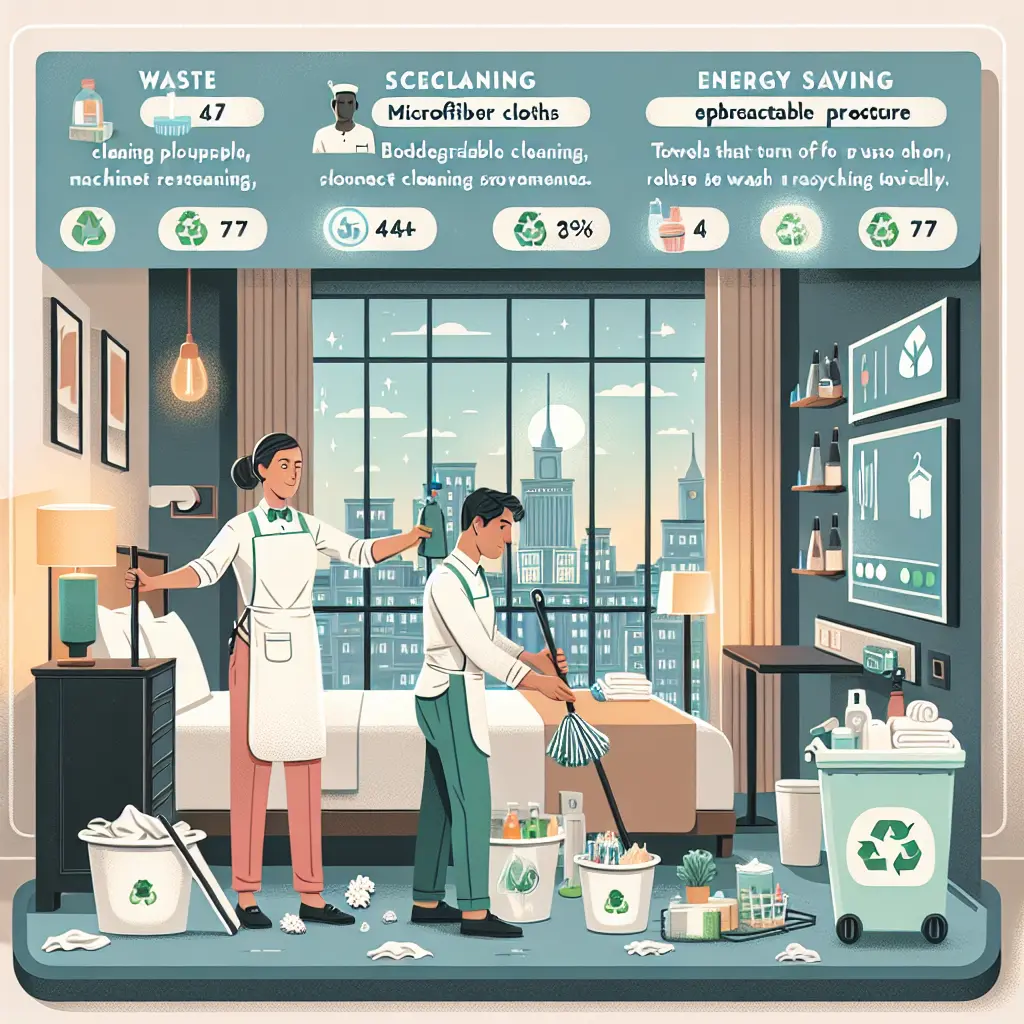In today’s rapidly evolving travel landscape, the hospitality industry is stepping up to champion sustainability. As eco-conscious travelers increasingly prioritize environmentally friendly hotels, the focus on sustainable hotel housekeeping has never been more crucial. Eco-friendly hotel practices are reshaping the way accommodations operate, integrating green housekeeping methods and sustainable hotel operations to reduce their carbon footprint. These hotel sustainability initiatives are pivotal in reducing waste in hotels and promoting efficient resource management.
From using biodegradable hotel supplies and sustainable cleaning products for hotels to implementing energy-efficient hotel housekeeping techniques, these changes are tangible steps toward a greener future. Water conservation in hotels, alongside zero waste hotel practices, further underscores the industry's commitment to eco-friendly operations. Organic hotel amenities and sustainable food practices in hotels are becoming the norm, offering guests an experience that aligns with their values.
Moreover, the rise of green hotel certifications serves as a testament to a hotel’s dedication to sustainability, reassuring eco-conscious hotel guests that their stay supports responsible practices. As hotels innovate with new waste management strategies, they not only enhance their appeal but also contribute to significant carbon footprint reduction in hotels.
For professionals and enthusiasts alike, exploring these sustainable practices offers insight into the broader movement towards sustainable travel accommodations. As we delve into this transformation within the hospitality sector, we'll uncover how hotels are creatively addressing environmental challenges, setting a precedent for future developments.
In the modern hospitality industry, the emphasis on sustainable hotel housekeeping has grown tremendously, driven by the increasing demand from eco-conscious hotel guests. Recent developments indicate that hoteliers are increasingly implementing eco-friendly hotel practices to meet these demands. Not only do these efforts align with global sustainability goals, but they also enhance a hotel’s appeal and operational efficiency.
Sustainable Practices in Hotel Housekeeping
The rise of green housekeeping methods is one of the most notable shifts in hotel sustainability initiatives. A report from Hospitality Net highlights the importance of balancing technology with human touch to streamline operations while maintaining guest satisfaction. This balance is crucial as hotels adopt sustainable cleaning products for hotels, reducing harmful chemical exposure for both staff and guests.
Biodegradable hotel supplies have become a staple in many environmentally friendly hotels. These supplies, which include everything from cleaning agents to guest toiletries, break down more easily in the environment, minimizing waste. The adoption of biodegradable products is part of a broader commitment to zero waste hotel practices. By reducing waste in hotels, these practices significantly contribute to carbon footprint reduction in hotels.
Energy efficiency is another critical component of sustainable hotel operations. According to Agilysys, many hotels are turning to smart technologies to manage energy consumption more effectively. For instance, the use of motion sensors for lighting and heating systems ensures that energy is only used when necessary. Such energy-efficient hotel housekeeping techniques are not only cost-effective but also reduce the environmental impact.
Water conservation in hotels is also gaining momentum. Low-flow faucets, showerheads, and dual-flush toilets are becoming common installations in guest rooms, significantly reducing water usage. Some hotels have even introduced greywater recycling systems, where water from baths and sinks is reused for landscaping, further enhancing their eco-friendly hotel practices.
Engaging Eco-Conscious Hotel Guests
Eco-friendly hotel amenities have evolved beyond just being a marketing tool; they are now a core aspect of a hotel’s offering. Many establishments provide organic hotel amenities that appeal to health-conscious travelers. These amenities often include natural bath products and sustainable food practices in hotels, such as sourcing local and organic produce for their restaurants.
A feature in Uproxx revealed that guests appreciate these sustainable offerings, often citing them as reasons for choosing particular accommodations. This preference aligns with the growing trend of hotels pursuing green hotel certifications, which serve as official endorsements of their commitment to sustainable travel accommodations.
Effective hotel waste management strategies are crucial for reducing environmental impact. As reported by Hospitality Net, hoteliers are focusing on innovative approaches to minimize waste generation. These include comprehensive recycling programs and partnerships with local charities for food donations, ensuring that excess food is redistributed rather than discarded.
The success of such initiatives often depends on staff training and guest participation. By educating both employees and guests about the benefits of sustainable practices, hotels can foster a culture of environmental responsibility. Simple steps, such as encouraging guests to reuse towels or participate in recycling programs, can make a significant difference.
Technology plays a pivotal role in achieving sustainability goals within the hospitality sector. According to Hospitality Net, integrating smart technologies can help reduce operational costs while enhancing service delivery. Automated systems for monitoring energy and water usage allow hotels to optimize their consumption patterns, aligning with broader sustainability objectives.
Furthermore, digital platforms facilitate effective communication with guests regarding eco-friendly practices during their stay. By leveraging technology, hotels can provide real-time updates on their sustainability initiatives, encouraging guests to engage with these efforts actively.
Embracing Technology for Sustainability
Engaging with eco-conscious hotel guests is essential for the successful implementation of sustainable practices. A study published in PLOS ONE emphasizes the importance of responsive communication strategies when addressing guest concerns about sustainability efforts. By effectively managing feedback and promoting transparency, hotels can build trust and loyalty among their environmentally conscious clientele.
Hoteliers are increasingly recognizing that guests want their values reflected in their choice of accommodations. Offering personalized experiences that align with these values not only satisfies guests but also encourages repeat business and positive word-of-mouth recommendations.
In conclusion, the commitment to sustainable practices in hotel housekeeping is reshaping the industry landscape. By adopting green housekeeping methods, energy-efficient technologies, and eco-friendly amenities, hotels are paving the way for a more sustainable future. As this movement continues to gain traction, it sets a precedent for other sectors within the travel industry to follow suit.
In summary, the shift towards sustainable practices in hotel housekeeping is redefining the hospitality landscape, aligning with global sustainability goals, and enhancing both guest satisfaction and operational efficiency.






Leave a Comment